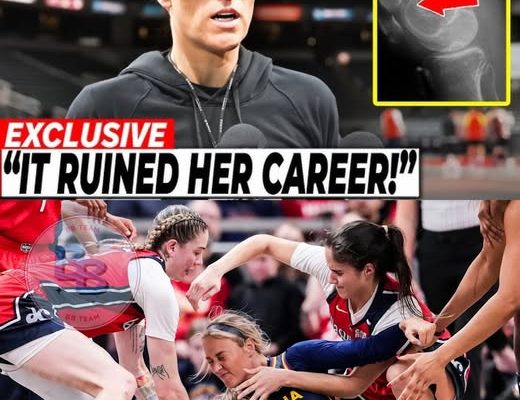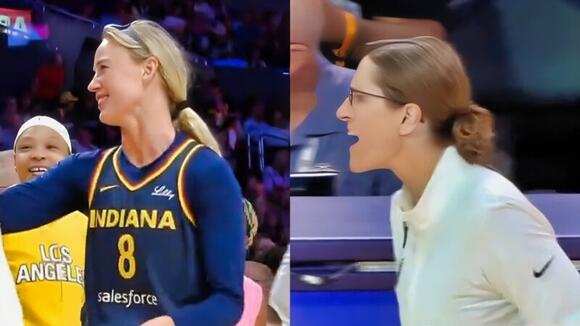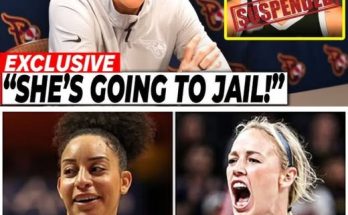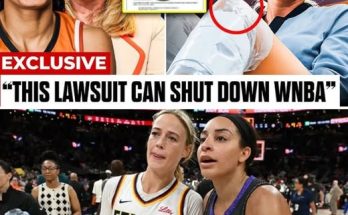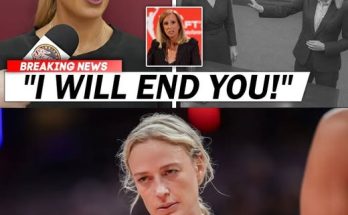The Bria Hartley–Sophie Cunningham Scandal: The Laugh That Broke the WNBA
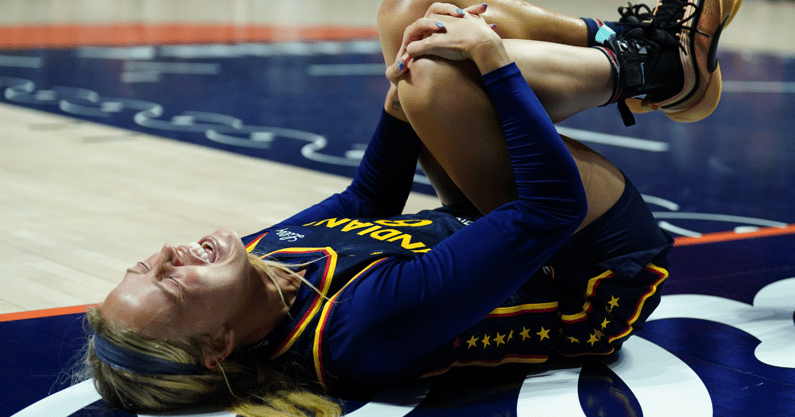
It wasn’t a game-winning shot. It wasn’t a buzzer-beater. The single image that broke the internet and rocked the WNBA was something darker, uglier, and unforgettable: Sophie Cunningham, writhing in pain on the hardwood, and Bria Hartley—her aggressor—smiling. A mocking grin while her opponent lay broken.
That moment didn’t just ignite outrage. It exposed something far more corrosive at the heart of the WNBA. It wasn’t simply about a dirty play—it was about a culture of negligence, hypocrisy, and dangerous leniency that threatens to unravel the league from within.
The Attack That Sparked It All
The incident happened with just over eight minutes left in the second quarter of what looked like a routine game. Cunningham, known for her toughness and unrelenting hustle, was battling for position. In a heartbeat, Bria Hartley hurled herself low—directly into Cunningham’s knees.
The impact was immediate and brutal. Cunningham crumpled to the court, clutching her leg, her season flashing before her eyes. Hard fouls happen in basketball. Collisions are part of the game. But this wasn’t that. This was different.
There was no play on the ball. No accidental tangle. Hartley’s angle, velocity, and target left little room for interpretation. It looked like a targeted strike, a human torpedo designed to do damage.
The Smirk That Changed Everything
If the play itself had sparked outrage, what happened moments later transformed anger into a full-blown firestorm. As Cunningham lay on the court in visible agony, the cameras cut to Hartley.
She wasn’t concerned. She wasn’t apologetic. She wasn’t even neutral.
She was laughing.
A wide, satisfied grin spread across her face as her teammates gathered. To fans, it wasn’t the look of nervous relief—it was the look of someone celebrating what she had just done.
When the photo hit social media, it spread like wildfire. On one side of the image: Sophie Cunningham, broken and helpless. On the other: Bria Hartley, smiling like she had just won a championship.
The internet branded it instantly: evil, malicious, vicious.
A Family’s Fury
If the WNBA tried to sweep it under the rug, Sophie Cunningham’s family refused. Her sister and mother exploded on social media, ripping into Hartley as a “reckless, mean-spirited player” with a track record of this exact kind of behavior.
Their words weren’t empty. Sophie herself amplified them by retweeting their statements—her silent confirmation that her family was speaking the truth on her behalf. It was the kind of quiet defiance that hit harder than a thousand press releases.
This was no longer about a foul. It was about a daughter, a sister, and a league that failed to protect her.
Hartley’s Pattern of Violence
Fans quickly turned into investigators, pulling receipts and exposing Hartley’s history. From yanking Angel Reese to the floor by her ponytail, to dragging Becca Allen down by the head, to instigating repeated scuffles—Hartley’s record of dirty plays was undeniable.
This wasn’t an isolated incident. It was a pattern. A pattern the league had ignored, time and time again.
The message was clear: if you’re willing to play recklessly enough, the WNBA won’t stop you.
The Hypocrisy of League Leadership
And that’s what made this moment explosive. The WNBA is quick to fine players thousands for criticizing referees or speaking out of turn. Words are punished harshly. But when Hartley endangered another player’s career—and then mocked her pain—the league’s response was silence.
That silence wasn’t neutral. It was damning.
By refusing to act, Commissioner Cathy Engelbert and league leadership sent a message louder than any statement: player safety is optional. The feelings of referees matter more than the health of athletes.
The result? A growing distrust from fans, players, and even families who feel abandoned by the league that claims to represent them.
The Caitlin Clark Factor
This outrage didn’t come in a vacuum. From her first game, Caitlin Clark—the league’s newest superstar—has been the target of relentless hard fouls, off-ball shoves, and cheap shots. The infamous Kennedy Carter hip check was just one example in a growing list of attacks that fans say cross the line from competition to assault.
The league’s timid and inconsistent handling of Clark’s treatment already had fans furious. Now, with Hartley’s attack on Cunningham, those fears have been confirmed: this isn’t just about one player. It’s systemic.
If stars like Clark and Cunningham aren’t safe, then who is?
The Sisterhood Myth, Shattered
For years, the WNBA has sold itself as a sisterhood. A family. A league built on respect, unity, and empowerment.
But the image of Hartley laughing over Cunningham’s broken body shattered that narrative like glass. Families don’t laugh when their sisters are in pain. Sisterhood doesn’t stay silent while one of its own lies broken.
That photo didn’t just stain Hartley’s reputation. It stained the league itself.
The Political Powder Keg
The controversy has even drawn the attention of national commentators. ESPN’s Stephen A. Smith speculated that if the WNBA doesn’t protect its players, especially high-profile stars like Caitlin Clark, it could open the door for political figures like Donald Trump to seize on the chaos.
Imagine it: a former president turning the WNBA’s failures into a political talking point, dragging the league into national debates on race, gender, and safety. The idea sounds extreme, but the outrage has already spilled beyond the sports bubble.
If leadership continues to ignore the problem, outside forces will happily take control of the narrative.
A League on the Brink
This scandal is no longer just about Sophie Cunningham’s knee or Bria Hartley’s smirk. It’s about the WNBA itself—and whether it values its image over its players.
By punishing words more than reckless actions, by ignoring patterns of dangerous play, and by failing to act decisively, the league has betrayed its athletes and fans alike.
And the viral image that started it all? It will haunt them until something changes.
Because in that one frozen frame, the mask slipped. The carefully crafted sisterhood façade collapsed. And what was revealed underneath wasn’t unity—it was indifference.
The WNBA wanted more attention. Now it has it. For all the wrong reasons.
